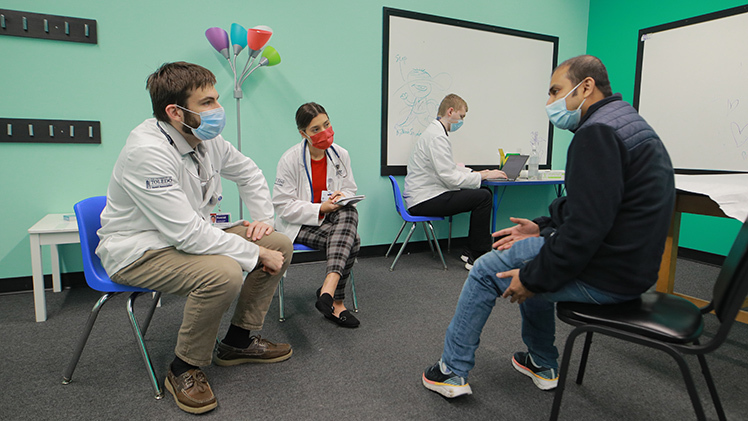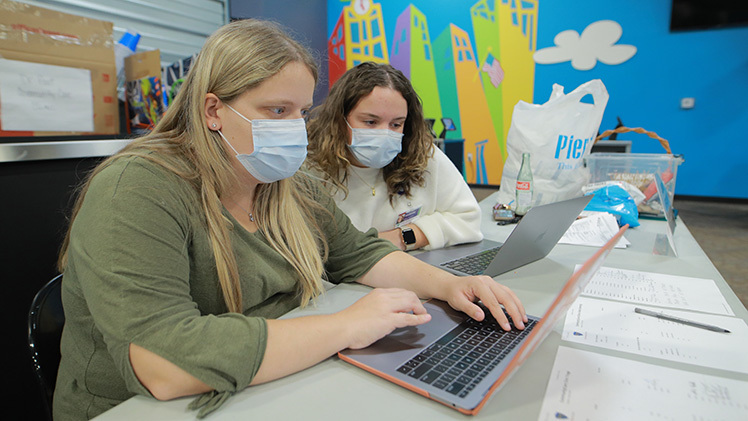There wasn’t anything particularly notable about the clinic visit. Just a medication refill.
Addison Sparks, then a first-year medical student at The University of Toledo, served as a translator to ensure the patient — a native Spanish speaker — received the proper prescription.

From left, Konrad Katterle and Gabby Groff, both students in the UToledo College of Medicine and Life Sciences, meet with patient Mir Himayet Kabir at the CommunityCare Clinic.
The full impact was felt a few weeks later when the woman returned and asked by name for Sparks, who is fluent in Spanish.
“She said I was friendly and helpful and she wanted me in the room,” said Sparks, who is now in her second year. “I had to step out for a moment. I was so grateful that I could make a positive experience for her, that she felt safe in our clinic, felt safe with me, that we’d properly communicated with her to get her the help she needed.”
Sparks is the executive director of the CommunityCare Clinics, a student-run organization that provides free medical services to some of the community’s most vulnerable individuals.
Working alongside faculty volunteers who are licensed healthcare providers, dozens of students from UToledo’s colleges of Medicine and Life Sciences, Pharmacy and Pharmaceutical Sciences, Nursing, and Health and Human Services conduct preventative health screenings, refill prescriptions, diagnose illnesses and offer general wellness education.
Through various community partnerships, they’re also able to help connect individuals to free or low-cost services like imagining or lab work that go beyond what’s offered at their clinics.
“We talk about social determinants of health in every class,” said Hanna Rowell, a pharmacy student in her third year of the professional program who serves as the group’s director of pharmacy relations. “We’re being trained to make an impact on the community regardless of a person’s capability to understand something, to pay for something, to travel. It’s our job to come to them and help with those services. I think it helps reaffirm their importance in the world, regardless of where they’re at.”
Now in its 12th year, the organization is one of the largest student-run free clinics in the country. In 2021, the group saw 1,390 patients who attended 3,685 healthcare visits.
The group holds a weekly indoor clinic on Thursdays at CedarCreek Church in South Toledo and a pair of outdoor neighborhood pop-up clinics on Mondays in south and east Toledo. It also offers twice-monthly specialty clinics focused on women’s health, HIV testing and providing care for the city’s homeless population.
Within the last year, the organization also has partnered with other community nonprofits to begin offering basic vision screening and audiology referrals.
Appointments are not required, and all care — including prescription medication — is free.
“We have many patients that come in and say without our clinic they wouldn’t be able to get the care they need to go along with their day,” said Nathan Gembreska, a second-year medical student. “We’re able to manage many chronic conditions that would normally cost our patients an exorbitant amount of money, but we have the meds here in our pharmacy.”
Funding for the clinic comes exclusively through grants and donations. To make a donation, go to The University of Toledo Foundation website.
Dr. Susan Batten, an associate professor in the College of Nursing who serves as the group’s faculty nursing director, said there’s a significant need for the service CommunityCare Clinics provide.

Addison Sparks, left, a second-year medical student at The University of Toledo, is the executive director of the CommunityCare Clinics, a student-run organization that provides free medical services to some of the community’s most vulnerable individuals.
“We have a large population of unserved and underserved patients and families. A lot of people don’t have insurance, don’t qualify for Medicaid or aren’t at the age threshold for Medicare,” she said. “We’re here to ensure they don’t fall through the cracks.”
Batten, who has long done community healthcare outreach, was one of the CommnityCare Clinics’ original faculty advisers and has remained active with the group since its founding.
In addition to benefitting the community, she said the organization serves an important role in students’ development of both clinical skills and soft skills.
“They’re learning to interview people, learning to listen and hear the story, and I think they learn how to ask difficult questions when necessary,” Batten said. “They are also connecting what they’re learning in theory with patients and clinical care. You can see the light bulb come on as they become more confident.”
Students split into interprofessional care teams at the clinics, giving learners from different programs an opportunity to collaborate in a way that will prepare them for their future roles in clinical healthcare.
While the clinics primarily serve those with no or limited health insurance, members say they also see patients with other barriers — some as simple as not being able to get in to see their primary care provider soon enough for their concern.
“There is an array of reasons people can’t access healthcare. It’s something I’m really passionate about,” Sparks said. “Growing up my mom didn’t have access to healthcare and had some health issues. Healthcare is a human right. I stand behind that. The clinic stands behind that. It’s essential that people should be able to access equal care.”